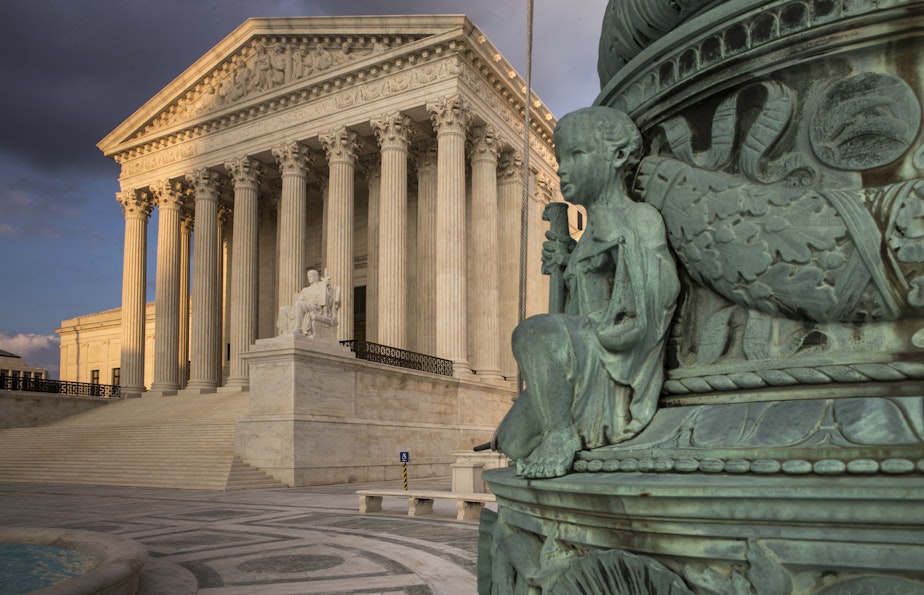What does SCOTUS' ruling against affirmative action mean for WA?

Washington state college and university officials are grappling with how to move forward in the wake of the Supreme Court’s ruling against race-conscious admissions processes.
Here in Washington, the use of affirmative action in public universities has been illegal since 1998, when voters approved Initiative 200.
But Thursday’s ruling would bar both public and private higher education institutions from considering race when deciding between equally qualified applicants for admission. It’s expected to cause massive upheaval in college admissions across the nation.
Washington private college leaders said they’re monitoring how the ruling will impact admissions processes.
Seattle University president Eduardo Peñalver called the ruling disappointing. And he reaffirmed the university's commitment to diversity, saying it's intrinsic to its mission “to empower leaders for a just and humane world.”
Sponsored
“At Seattle University, we will continue to use every tool consistent with the law to create and sustain a diverse and inclusive academic community,” he wrote in a statement. “We will make every effort to continue to recruit and retain students who reflect the diversity of the world we are preparing our students to lead.”
Thayne McCulloh, president of Gonzaga University in Spokane, also said the ruling will not change the institution’s commitment to creating a “welcoming, inclusive, and diverse campus community.”
“We are an institution committed to the thriving of all individuals, and thus will continue to foster engagement between people of different identities, cultures, and backgrounds,” he wrote.
Thursday's decision overturns more than four decades of legal precedent, upheld over the years by narrow court majorities that included Republican-appointed justices, according to NPR. The Supreme Court had last considered affirmative action in 2016. In that 4-3 decision, the court upheld the University of Texas’ admissions process, dismissing the racial discrimination claim brought by Abigail Noel Fisher, a white woman who was rejected by the university in 2008.
Along with Washington, eight other states have also previously banned affirmative action: Arizona, California, Florida, Idaho, Michigan, Nebraska, New Hampshire, and Oklahoma.
Sponsored
In recent years, some Washingtonians have pushed back on Initiative 200. A 2019 attempt to restore affirmative action in Washington failed by a narrow margin. And last year, Gov. Jay Inslee rescinded a 1998 directive that laid out how state agencies should comply with Initiative 200.
Inslee called the old directive “overly restrictive” and said his replacement executive order would “instruct agencies on how to move forward with achievement equity” by giving them the ability to recruit in employment and admissions with the intent of expanding diversity.
Since then, few Washington universities have changed their approach, Crosscut reported in April. And the disparity between the percentage of underrepresented students graduating from Washington high schools and the percentage enrolled at the University of Washington has grown.
A 2020 Brookings Institution study found that the gap was 4.3% not long after the 1998 affirmative action ban, and it grew to nearly 8% in 2015.
In a statement, University of Washington President Ana Mari Cauce said the institution remains “firmly committed to creating opportunity and expanding access to world-class education for students from all backgrounds.”
Sponsored
“This is central to our public mission as the University FOR Washington,” Cauce wrote, adding officials will review the action and any impacts on the university.
Natasha Martin is the vice president for diversity and inclusion at Seattle University. She said that while Thursday's affirmative action ruling came as no surprise, it demonstrates a misunderstanding of how race affects a person's access to opportunities.
"It assumes that race has no impact on the experiences of students," Martin said. "And so it really is, in my mind, a decision that promotes a scarcity mindset, and one that is not grounded in the racial realities of our country and promotes a really cramped view of what 'inclusion' means...and this idea of what 'merit' means."
Martin pointed to research showing a dip in college enrollment among underrepresented groups in states where lawmakers have adopted "race neutral" measures, like Washington and California. In 1999, the year after Initiative 200 passed in Washington, enrollment among underrepresented racial groups, excluding Asian Americans, dwindled from 8.8% to 5.6%. However, those numbers have since rebounded at the University of Washington.
But as a private institution, Seattle University wasn't subject to anti-affirmative action measures — until now. Martin described what it looks like to use race as a factor in a holistic admissions process.
Sponsored
"Our commitment is to educate the whole person, and so we are looking at the whole student in terms of a student's application materials," she said. "And that includes the experiences and backgrounds from which they come. And so we work very hard at that. We think that it matters a great deal to the type of students that we're able to bring to the university, the type of learning environment we're able to create here."
Martin also called out an apparent dissonance between the ruling and the racial disparities underscored by the pandemic, such as those in educational and economic outcomes. She also drew a connection between the affirmative action ruling and ongoing efforts to ban critical race theory, the study of institutional racism, in American schools.
"That really troubles me as someone who works very hard to create broad, inclusive learning and engagement environments for the benefit of all students," she said.
To listen to the full interview with Martin, click the play button at the top of this story.







